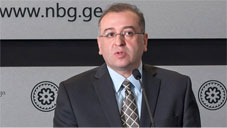
NBG leaves monetary policy rate unchanged at 8 %
By Natalia Kochiashvili
Friday, February 5
At the Monetary Policy Committee meeting of the National Bank of Georgia (NBG) it decided to leave the refinancing rate unchanged at 8.0%.
According to the National Statistics Office, in January 2021, compared to the previous month, the inflation rate in Georgia was 1.1 %, and the annual inflation rate was 2.8 %. According to the NBG head, Koba Gvenetadze, this reduction in the last two months is related to the subsidy of utility bills by the government and is of a temporary nature. According to him, as a rule, central banks do not respond to temporary deviations of inflation due to similar types of exogenous factors and are guided by the medium-term inflation forecast.
According to the current forecast, under other equal conditions, inflation will remain at an average of 4 % in 2021 and then gradually approach the target. Compared to the previous forecast, among the factors affecting the dynamics of inflation is a significant increase in prices in international commodity markets, which was especially pronounced in January.
“However, upward pressure on inflation is maintained against the backdrop of the prolongation of pandemic-related constraints due to rising production costs and a depreciating rate. The latter, in turn, increases imported inflation and intermediate costs.” Gvenetadze explained.
NBG president also informed, that despite the relatively strong domestic demand, aggregate demand is still reduced due to the sharp decline in external demand. However, the depreciation of the nominal effective exchange rate weakens the downward impact of aggregate demand on projected inflation, and due to the high dollarization of the economy, the transmission of exchange rate fluctuations to inflation is palpable. In addition, the completion of the partial subsidy of interest expense on mortgages actually has a similar effect to the tightening of monetary policy.
The Committee also noted that uncertainty remains high about both the dynamics of the recovery of global economic activity and the growth rate of local lending. Taking into account the above-mentioned factors, the need to maintain a tighter monetary policy was identified.
Gvenetadze noted that according to preliminary indicators, the joint demand is weak. The current estimates indicate that economic activity in December fell by 7.9 % annually, and the 12 month average is -6.1 %. After declining in 2020, a gradual recovery of economic activity from 2021 is expected.
As for current figures, revenues from international travelers are minimal and, according to preliminary data, fell by 93 % year on year in December. Amid weak aggregate demand and a depreciating exchange rate, imports of goods fell 18 % year on year in December.
According to the President of the NBG, monitors the current economic processes and financial markets on a continuous basis and will use all the tools at its disposal to ensure price stability.
The next meeting of the Monetary Policy Committee will be held on March 17, 2021.


